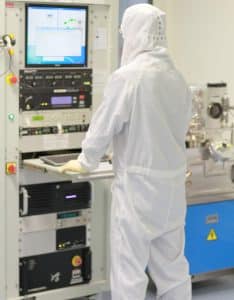The Importance of Cleanrooms in Metal Deposition & Micro-Manufacturing
Industries in which nanoparticles can interfere with manufacturing processes need to use a clean room to maintain the utmost accuracy. Cleanrooms control the humidity, contamination, temperature, and pressure of facilities.
As innovation drives the metal deposition and micro-manufacturing forward, organizations are under increasing pressure to guarantee that their facilities can withstand fast growth. Cleanrooms are frequently used in metal deposition applications and are available in a range of sizes and complexities, with some processes requiring more controlled environments than others.
Specific standards for cleanrooms are set and regulated by governments across the globe and these requirements are usually extremely strict. Cleanrooms are used to significantly limit the risk of contamination of materials such as dust and dirt in the atmosphere. The International Standards Organization (ISO) give cleanrooms a ‘class’ from one to nine, with the lowest number being the most meticulously clean environment.
What is Metal Deposition?
Metal deposition refers to any technique in which a metallic starter material evaporates in vacuum conditions and is then precipitated on a target substrate. Evaporative techniques of metal deposition take place under high or ultra-high vacuum to offer a free mean path for vapor-phase molecules to reach the target.

Contaminant gases in the vacuum environment can lead to molecular collisions which diminish process efficiency and impact the planarity of the thin film. Before the thin film material enters the gaseous environment, it requires evaporation via a heat source.
One form of metal deposition is chemical vapor deposition, one of the most common forms of vacuum engineering in which chemical reactions at the target form thin coatings. This is done by heating the substrate using a flow of reactant gases.
Molecular bean epitaxy (MBE) is an extremely advanced form of thermal metal deposition, it is a slow process which forms epitaxial thin films using the gradual sublimation of starter metals such as gold.
Why Cleanrooms are Integral to a Successful Metal Deposition
When working with nano-scale particles in metal deposition, even the smallest speck of dust can have the impact of a boulder. Cleanrooms are fitted with advanced filtering and vibration control systems which allow scientists to make highly accurate measurements and alter materials at the nanoscale.
At Platypus Technologies, thin metal films are fabricated in a dedicated cleanroom environment with advanced environmental controls. This cleanroom environment helps minimize particle and chemical contamination and reduce the effects of temperature or humidity variations during fabrication of micro-scale devices. Thus, we ensure high quality and high reproducibility in the fabrication of patterned metal films for our customers.
To find out more about how Platypus Tech can help with metal deposition and micro-manufacturing, contact us today.